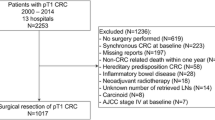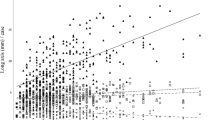Abstract
Background: Adjuvant chemotherapy for patients with stage III (node-positive) colorectal cancer (CRC) reduces mortality by one third. Retrieval of an inadequate number of lymph nodes in the surgical specimen may result in incorrectly designating some patients as stage II (node negative), and consequently, such patients may not be offered appropriate chemotherapy. Recent National Cancer Institute guidelines suggest that a minimum of 12 nodes should be examined to ensure accurate staging.
Methods: This population-based study identified stage II (T3N0 and T4N0) CRC cases by using CRC pathology reports (1997–2000) from the Ontario Cancer Registry. Patients aged 19 to 75 years were identified, and demographic, surgical, pathologic, and hospital data were extracted. Factors relating to the number of lymph nodes assessed were examined.
Results: A total of 8848 CRC cases were reviewed, and 1789 stage II cases were identified. Seventy-three percent of cases were designated as node negative on the basis of assessment of <12 lymph nodes. Multivariate analysis showed that age, tumor size, specimen length, use of a pathology template, and academic status of the hospital were significant predictors of the number of lymph nodes assessed.
Conclusions: A subset of patients with CRC in Ontario were assigned stage II disease on the basis of examination of relatively few lymph nodes.
Similar content being viewed by others
REFERENCES
InstitutionalAuthorNameNational Cancer Institute of Canada. (2001) Canadian Cancer Statistics 2001. National Cancer Institute of Canada Toronto: 19
InstitutionalAuthorNameAmerican Cancer Society (2002) Surveillance research Cancer Facts & Figures. American Cancer Society Atlanta, GA: 4
Troisi RJ, Freedman AN, Devesa SS. Incidence of colorectal carcinoma in the U.S.: an update of trends by gender, race, age, subsite, and stage, 1975–1994. Cancer 1999;85:1670–6.
Compton CC. Pathology report in colon cancer: what is prognostically important? Dig Dis 1999;17:67–79.
Moertel CG, Fleming TR, Macdonald JS, et al. Fluorouracil plus levamisole as effective adjuvant therapy after resection of stage III colon carcinoma: a final report. Ann Intern Med 1995;122:321–6.
Moertel CG, Fleming TR, Macdonald JS, et al. Levamisole and fluorouracil for adjuvant therapy of resected colon carcinoma. N Engl J Med 1990;322:352–8.
Wolmark N, Rockette H, Mamounas E, et al. Clinical trial to assess the relative efficacy of fluorouracil and leucovorin, fluorouracil and levamisole, and fluorouracil, leucovorin, and levamisole in patients with Dukes’ B and C carcinoma of the colon: results from National Surgical Adjuvant Breast and Bowel Project C-04. J Clin Oncol 1999;17:3553–9.
Nascimbeni R, Burgart LJ, Nivatvongs S, Larson DR. Risk of lymph node metastasis in T1 carcinoma of the colon and rectum. Dis Colon Rectum 2002;45:200–6.
Scott KW, Grace RH. Detection of lymph node metastases in colorectal carcinoma before and after fat clearance. Br J Surg 1989;76:1165–7.
Fielding LP, Arsenault PA, Chapuis PH, et al. Clinicopathological staging for colorectal cancer: an International Documentation System (IDS) and an International Comprehensive Anatomical Terminology (ICAT). J Gastroenterol Hepatol 1991;6:325–44.
Wong JH, Severino R, Honnebier MB, Tom P, Namiki TS. Number of nodes examined and staging accuracy in colorectal carcinoma. J Clin Oncol 1999;17:2896–900.
Goldstein NS, Sanford W, Coffey M, Layfield LJ. Lymph node recovery from colorectal resection specimens removed for adenocarcinoma. Trends over time and a recommendation for a minimum number of lymph nodes to be recovered. Am J Clin Pathol 1996;106:209–16.
Nelson H, Petrelli N, Carlin A, et al. Guidelines 2000 for colon and rectal cancer surgery. J Natl Cancer Inst 2001;93:583–96.
Law CHL, Rapanos T, Al Zahrani M, Hanna SS, Smith AJ. The impact of lymph node retrieval on the prognosis of stage II colon cancer. Ann Surg Oncol 2002; 9(Suppl):S65.
Caplin S, Cerottini JP, Bosman FT, Constanda MT, Givel JC. For patients with Dukes’ B (TNM stage II) colorectal carcinoma, examination of six or fewer lymph nodes is related to poor prognosis. Cancer 1998;83:666–72.
Prandi M, Lionetto R, Bini A, et al. Prognostic evaluation of stage B colon cancer patients is improved by an adequate lymphadenectomy: results of a secondary analysis of a large scale adjuvant trial. Ann Surg 2002;235:458–63.
Bull AD, Biffin AH, Mella J, et al. Colorectal cancer pathology reporting: a regional audit. J Clin Pathol 1997;50:138–42.
Maurel J, Launoy G, Grosclaude P, et al. Lymph node harvest reporting in patients with carcinoma of the large bowel: a French population-based study. Cancer 1998;82:1482–6.
InstitutionalAuthorNameStatistics Canada. (2002) Estimates of Population by Age and Sex for Canada, the Provinces and the Territories. Statistics Canada Ottawa, Canada: 25
RJ Black L Simonate HH Storm E Demaret (Eds) (1998) Automated Data Collection in Cancer Registration. World Health Organization Lyon: 39–44
Joo JS, Amarnath L, Wexner SD. Is laparoscopic resection of colorectal polyps beneficial? Surg Endosc 1998;12:1341–4.
Franklin ME Jr, Rosenthal D, Abrego-Medina D, et al. Prospective comparison of open vs. laparoscopic colon surgery for carcinoma. Five-year results. Dis Colon Rectum 1996;39:S35–S46.
Senagore AJ, Luchtefeld MA, Mackeigan JM, Mazier WP. Open colectomy versus laparoscopic colectomy: are there differences? Am Surg 1993;59:549–53.
Diggle PJ, Liang KY, Zeger SL. Analysis of Longitudinal Data. New York: Oxford University Press, 1994.
InstitutionalAuthorNameSAS Institute Inc. (1999) SAS/STAT User’s Guide Version 8.29 SAS Institute Inc. Cary, NC 1365–1464
McArdle CS, Hole D. Impact of variability among surgeons on postoperative morbidity and mortality and ultimate survival. BMJ 1991;302:1501–5.
Scott KW, Grace RH, Gibbons P. Five-year follow-up study of the fat clearance technique in colorectal carcinoma. Dis Colon Rectum 1994;37:126–8.
Koren R, Siegal A, Klein B, et al. Lymph node-revealing solution: simple new method for detecting minute lymph nodes in colon carcinoma. Dis Colon Rectum 1997;40:407–10.
Galvis CO, Raab SS, D’Amico F, Grzybicki DM. Pathologists’ assistants practice: a measurement of performance. Am J Clin Pathol 2001;116:816–22.
Murray D, Hreno A, Dutton J, Hampson LG. Prognosis in colon cancer: a pathologic reassessment. Arch Surg 1975;110:908–13.
Patt DJ, Brynes RK, Vardiman JW, Coppleson LW. Mesocolic lymph node histology is an important prognostic indicator for patients with carcinoma of the sigmoid colon: an immunomorphologic study. Cancer 1975;35:1388–96.
Recommendations for the reporting of resected large intestinal carcinomas. Association of Directors of Anatomic and Surgical Pathology. Mod Pathol 1996;9:73–6.
Cross SS, Feeley KM, Angel CA. The effect of four interventions on the informational content of histopathology reports of resected colorectal carcinomas. J Clin Pathol 1998;51:481–2.
Compton CC, Fielding LP, Burgart LJ, et al. Prognostic factors in colorectal cancer. College of American Pathologists Consensus Statement 1999. Arch Pathol Lab Med 2000;124:979–94.
Compton CC. Updated protocol for the examination of specimens from patients with carcinomas of the colon and rectum, excluding carcinoid tumors, lymphomas, sarcomas, and tumors of the vermiform appendix: a basis for checklists. Cancer Committee. Arch Pathol Lab Med 2000;124:1016–25.
Smith AJ, Law CHL, Khalifa MA, et al. Multimodal CME for surgeons and pathologists improves colon cancer staging. J Cancer Educ 2003;18;:81–5.
Simunovic M, To T, Baxter N, et al. Hospital procedure volume and teaching status do not influence treatment and outcome measures of rectal cancer surgery in a large general population. J Gastrointest Surg 2000;4:324–30.
Author information
Authors and Affiliations
Corresponding author
Rights and permissions
About this article
Cite this article
Wright, F.C., Law, C.H.L., Last, L. et al. Lymph Node Retrieval and Assessment in Stage II Colorectal Cancer: A Population-Based Study. Ann Surg Oncol 10, 903–909 (2003). https://doi.org/10.1245/ASO.2003.01.012
Received:
Accepted:
Published:
Issue Date:
DOI: https://doi.org/10.1245/ASO.2003.01.012




